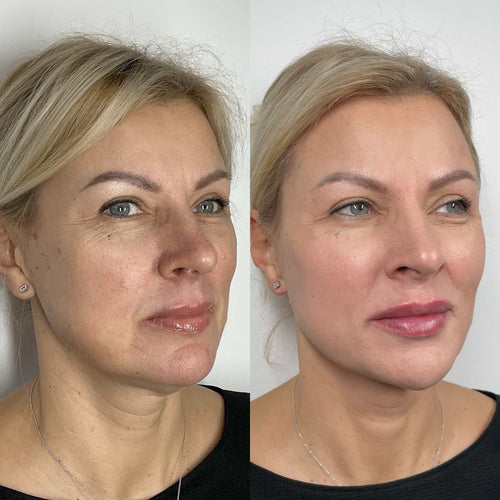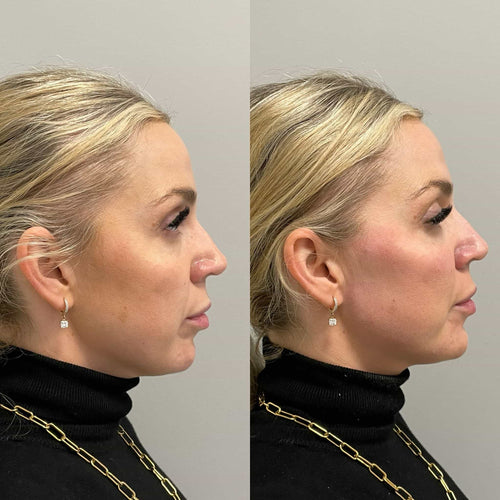Consult with Dr. Laura Geige for Dermal Fillers Now
Safety Concerns
Hormonal Changes
Safety concerns regarding lip filler injections during breastfeeding primarily revolve around potential risks to the nursing infant.
While hyaluronic acid, the most common filler substance, is generally considered non-toxic and not systemically absorbed in significant amounts, its long-term effects on breast milk are not fully understood.
There’s a theoretical possibility that small amounts of filler could pass into breast milk and subsequently be ingested by the infant. The potential for any adverse reactions in the baby is unknown.
Additionally, some fillers may contain additives or preservatives that could pose risks to infants with sensitivities or allergies.
Hormonal changes associated with breastfeeding can also influence how the body reacts to filler injections. Hormones like prolactin and oxytocin can affect tissue healing and fluid balance, potentially impacting the effectiveness and longevity of filler results.
It’s crucial to consult with a healthcare professional, ideally a board-certified plastic surgeon or dermatologist experienced in treating breastfeeding individuals, before considering any cosmetic procedures, including lip filler injections.
They can assess your individual health status, evaluate potential risks, and provide personalized guidance based on the latest research and best practices.
Ingredient Considerations
When considering cosmetic procedures like lip fillers during breastfeeding, safety concerns and ingredient considerations are paramount.
Hyaluronic acid, a common filler component, is generally considered safe for breastfeeding individuals. It’s naturally found in the body and is metabolized quickly. However, there is limited research specifically on hyaluronic acid fillers and breastfeeding.
Other fillers may contain substances that haven’t been thoroughly studied in lactating mothers. These can include lidocaine (a local anesthetic), which can pass into breast milk, though usually in small amounts.
It’s crucial to discuss your medical history, including breastfeeding, with a qualified and experienced injector before undergoing any procedure. They can assess your individual risk factors and provide personalized advice based on the specific filler being used.
Remember that every woman’s body reacts differently, and what might be safe for one person might not be suitable for another. It’s always best to err on the side of caution when it comes to making decisions about your health and the health of your baby.
Prioritize open communication with your healthcare provider throughout the process.
Expert Opinions & Recommendations
Guidance from Medical Professionals
Seeking expert opinions and recommendations from medical professionals is crucial when considering any cosmetic procedure, especially during breastfeeding.
Breastfeeding significantly impacts a woman’s body, including her hormone levels and metabolism. It’s important to understand how these changes might affect the body’s response to fillers.
A qualified dermatologist or plastic surgeon experienced in administering lip fillers can provide personalized advice based on individual circumstances, medical history, and current breastfeeding status.
They can assess potential risks and benefits, discuss alternative options if necessary, and ensure the chosen procedure aligns with your health and well-being while breastfeeding.
It’s essential to inquire about the specific type of filler used, as some ingredients might be more suitable during lactation than others.
Furthermore, understand the potential impact of fillers on milk supply or any possible transfer through breast milk.
Medical professionals can offer evidence-based information and address your concerns regarding safety for both mother and baby.
Always prioritize open communication with your healthcare provider throughout the process.
The American Academy of Pediatrics
Expert opinions regarding lip fillers and breastfeeding vary.
Some experts, citing the limited research on dermal filler safety during lactation, recommend avoiding them entirely while breastfeeding.
The American Academy of Pediatrics (AAP) does not explicitly address lip fillers in its breastfeeding guidelines.
However, their general principle is to err on the side of caution and minimize potential risks to the breastfeeding infant.
They emphasize that any medication or substance introduced into the body during breastfeeding has the potential to be transferred through breast milk.
Given this principle, consulting with a healthcare professional experienced in both breastfeeding and cosmetic procedures is crucial before considering lip fillers while breastfeeding.
This expert can assess individual circumstances, review the specific filler ingredients, discuss potential risks and benefits, and provide personalized guidance.
Schedule a Dermal Filler Consultation with Dr. Laura Geige
Factors to consider include the type of filler used, the amount injected, the individual’s medical history, and any potential allergies or sensitivities.
It’s essential to prioritize the health and well-being of both mother and infant.
Open communication with a healthcare provider is key to making informed decisions about cosmetic procedures during breastfeeding.
Alternative Options for Enhancing Lips During Breastfeeding
Temporary Solutions
While lip fillers are a popular choice for enhancing lips, there are concerns surrounding their safety during breastfeeding due to the potential transfer of filler ingredients to breast milk.
For those seeking to enhance their lips while breastfeeding, several alternative options exist that are generally considered safer.
These alternatives offer temporary solutions and can help boost lip appearance without introducing potentially harmful substances into your breast milk.
Hyaluronic Acid-Based Lip Plumpers:
These topical products contain hyaluronic acid, a natural substance found in the body that attracts and retains moisture. Applying a lip plumper can temporarily increase lip volume by hydrating and plumping them up.
Look for products with a concentration of at least 1% hyaluronic acid for noticeable results.
Lip Gloss and Tinted Lip Balms:
Using lip glosses or tinted lip balms can add a touch of color and dimension to lips, making them appear fuller. Choose products with hydrating ingredients and avoid those containing harsh chemicals or fragrances that could irritate sensitive skin.
Lip Liners and Highlighters:
Applying a lip liner slightly outside your natural lip line can create the illusion of fuller lips. Use a shade close to your natural lip color for a subtle effect, or choose a darker shade for more dramatic definition.
Highlighter applied to the Cupid’s bow (the dip in the center of your upper lip) can also accentuate its shape and make lips appear more voluminous.
**Lifestyle Changes:**
Staying hydrated and maintaining a healthy diet rich in vitamins and minerals can contribute to overall skin health, including lip hydration and fullness.
Getting enough sleep and managing stress levels also play a role in skin appearance.

It’s essential to consult with your doctor or lactation consultant before trying any new product or treatment during breastfeeding. They can provide personalized advice based on your individual circumstances and help ensure the safety of both you and your baby.

Focus on Lip Care
While lip fillers are popular, many women understandably wonder if they’re safe during breastfeeding. It’s wise to prioritize your baby’s health and consult with your doctor before making any decisions about cosmetic procedures.
Schedule a Dermal Filler Consultation with Dr. Laura Geige Now
If you’re looking for ways to enhance your lips without fillers while breastfeeding, consider these safe alternatives:
-
Over-the-Counter Lip Plumpers:**
These often contain ingredients like menthol or cinnamon that create a temporary tingling sensation, making lips appear fuller.
-
Lip Balm with Hyaluronic Acid:**
Hyaluronic acid is a naturally occurring substance in the body that attracts and retains moisture. It can help plump up lips and keep them hydrated.
-
Exfoliate Gently:
Regularly exfoliating your lips removes dead skin cells, revealing smoother, plumper-looking lips.
-
Hydrate from Within:**
Drinking plenty of water is essential for overall skin health, including lip hydration and plumpness.
-
Use a Lip Liner to Define:
A lip liner that matches your natural lip color can create the illusion of fuller lips by outlining their shape.
Remember, consistency is key. Incorporate these safe and natural methods into your routine for gradual lip enhancement during breastfeeding.
Press on Honey Emri Studio Madison Art Therapy Kahh Spence Beauty Azmia Magane
- Why Does My Craftsman Series Vape Taste Burnt? - November 12, 2025
- What Is The Best Way To Take CBD Gummy Edibles - November 9, 2025
- What Are The Best CBD Gummy Edibles For Chronic Pain - November 7, 2025
